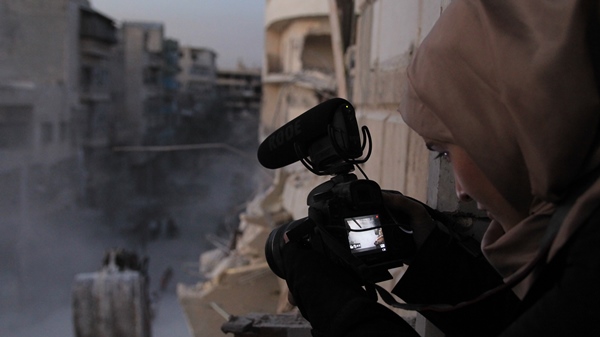![]() A powerful yet intimate documentary, For Sama looks at a humanitarian tragedy: the siege of the Syrian city of Aleppo, which left thousands dead or displaced. The point of view belongs entirely to journalist and co-director Waad al-Kateab, whose status as a mother significantly raises the stakes of an already high-risk situation. In early sequences, an explosion rips through the hospital in which she is staying, and her first instinct is to scramble downstairs to find her infant daughter, Sama, to make sure she’s alright.
A powerful yet intimate documentary, For Sama looks at a humanitarian tragedy: the siege of the Syrian city of Aleppo, which left thousands dead or displaced. The point of view belongs entirely to journalist and co-director Waad al-Kateab, whose status as a mother significantly raises the stakes of an already high-risk situation. In early sequences, an explosion rips through the hospital in which she is staying, and her first instinct is to scramble downstairs to find her infant daughter, Sama, to make sure she’s alright.
“What a life I’ve brought you into,” she tells the child. Her film, consisting of several years’ worth of footage shot by al-Kateab, explores why she and her husband chose to bring a child into such a dangerous world. Flashing back half a decade, we see the pro-democracy movement in Aleppo in full swing as the filmmaker, who at the time was a university student, uses her smartphone to capture a street-level view of mass protests. There is optimism in the air, but soon reality hits in the form of attempts by Syrian President Bashar al-Assad to quell the dissidents.
All-out war eventually breaks out, and we witness Aleppo gradually pounded into rubble via repeated airstrikes (the planes were provided by Russia to prop up the al-Assad regime), while the protagonists become increasingly weighed down by the stress of living in a war zone. Death may lurk around every corner, yet the people hold onto their humanity. Al-Kateab chronicles several friends’ attempt to build a hospital to care for the wounded, and there is also a touching love story involving the filmmaker and her eventual husband, a doctor named Hamza. Together they share a passion to see their homeland freed from al-Assad’s corrupt and repressive regime.
But the beating heart of the film is the titular baby, born not long after al-Kateab and Hamza’s nuptials. Through her camera, the mother constantly dotes on Sama. For much of the ensuing years, the tension involves keeping Sama safe as the siege rages on in the background while also giving her some semblance of a normal childhood. The latter involves community-wide dinners with other families that become evenings of cooking and singing. At one point, al-Kateab and friends throw a kids’ party in which everyone paints the exterior of an out-of-commission bus.
Downright oblivious at times to the sounds of violence occurring all around her, Sama represents just how resilient children can be. Others are not so lucky, and that fact does not escape al-Kateab, who is understandably sensitive to the suffering of families, especially children. Back at the hospital emergency room where Hamza and his fellow physicians wage a seemingly endless war against death, children are a common sight as either victims or scarred witnesses. More than once, the camera hones in on the shell-shocked face of a youth who explains how a sibling met a tragic end. These moments can be difficult to watch, but al-Kateab manages to capture moments that point out how the staff’s efforts are not always pointless.
The least visceral but no less gut-wrenching moments of the film occur when the conflict starts to turn in al-Assad’s regime’s favor, prompting Hamza to confess the lengths she’s willing to go to ensure Sama’s survival, and the harsh reality of being on the losing end of a war against a ruler who will go to any lengths to maintain power sets in. Then follows a series of near-death escapes that are legitimately suspenseful, though not because we question whether al-Kateab survives but for the outcome of others profiled, whose fates are kept secret by the cryptic opening segment.
Tellingly, al-Kateab’s camera captures the physical, and psychological, ways that she and Hamza have grown and evolved before our eyes. Specifically, al-Kateab becomes much steelier by the war’s end. The first time that a mortar explodes near her, she dashes behind a wall for cover. By contrast, after years of living with unpredictable bombardment, she no longer panics.
Aleppo itself comes across as a character, albeit one that suffers greatly as a result of the lengthy siege. While its future remains uncertain (the city is rebuilding as of this writing), there is no denying that before the war, it was a lively, bustling place. For Sama may represent a parent’s attempt to explain her actions to future grown-up progeny, but it’s also a tribute to a city that was once her family’s home, which currently exists solely on film and in memory.







Leave A Comment